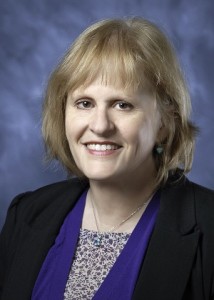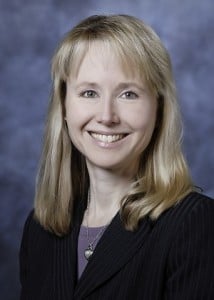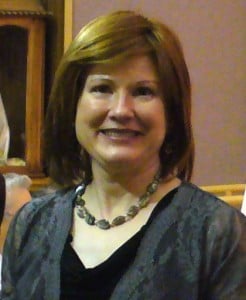
Image provided by Cedars-Sinai Medical Center
When Laura Young, Jewish Chaplain at Cedars-Sinai Medical Center in Los Angeles, presented her spiritual reflection on Alzheimer’s disease to the other Pastoral Care chaplains at Cedars, she did not know that I had requested an interview only a day or two before. But God had paved a way, and it was just after she finished her presentation that the direction of the Pastoral Care department asked her to speak with me.
“I’d seen a whole bunch of patients, children of patients, who were talking to me about the concept of a ‘long good-bye,'” she told me when we met recently. “How long it takes, and how painful it is, especially as society is aging. It touches me on a personal level. My mother, my biggest fan, the person who thought I was the most wonderful person in the world, has Alzheimer’s. Two years ago, she stopped recognizing my siblings. And recently, she stopped recognizing me.”
Such a loss could be devastating, but faith and the powerful support it can provide gives Laura a context to continue her relationship with her mother.
“The way I approach it is because of my own faith and sense of belief in God,” Laura said. “It’s important to be present for her, to treat her with respect and to help her on this path because she was here for me.”
Psalm 90:12 helped shape Laura’s spiritual reflection on Alzheimer’s disease and our response to it:
Teach us to count our days aright,
that we may gain wisdom of heart.
“It reminds us to use our time with those we love wisely, and to be a compassionate presence,” she said. “It isn’t about trying to force someone to remember something. It’s about being with the person that’s right there. It’s about listening to what they’re saying. Whatever they’re talking about, you go with what they’re talking about. Just be present.”
Another biblical image also helps fram Laura’s approach to caring about and for her mother.
“In the Jewish tradition, there’s a whole idea of how the first tablets [upon which were written the 10 Commandments] were broken, but they were still kept alongside the new, whole tablets,” she said. This correlates to keeping “respect for the aged,” the “broken” among us.
I spoke with Laura just before the beginning of the Jewish High Holy Days. We talked about how, in some families, the person with Alzheimer’s disease is excluded from gatherings, including holiday services. Some people are uncomfortable in the presence of someone with dementia, and others wish to spare the person with Alzheimer’s from being made fun of or otherwise hurt.
But Laura explained that, in her family’s case, they make the effort to try to bring her out for some services, or provide access to parts of those holidays that might touch part of her mother’s memory of them.
“For example,” she said, “Rosh Hashanah is coming. My mother couldn’t sit through the whole service, but she could hear the shofar blow. She could eat the apple with honey and celebrate the New Year. She could sing the songs. Music, oh, music attracts her so much.”
“My mother can get up and dance, all she has to do is hear music. The few times she hasn’t been able to walk, she’ll still dance in her chair. It perks up her soul. Music is a way to reach our inner souls. And I think that that does not go away.”
An experience Laura and her family had recently illustrates this perfectly:
“My nephew had a Bar Mitzvah in November. My mother and father got called up for an Aliyah [a song usually sung at the beginning of the service]. Now my mother who has Alzheimer’s disease, who can’t remember who the Bar Mitzvah boy is, or that she’s there, got up and sang an Aliyah perfectly in Hebrew!”
The moment was captured in video, a treasure for years to come.
Laura smiles, “Later on, when she told me, ‘I didn’t get to go to the Bar Mitzvah. Nobody invited me,’ I said, ‘Oh, yes you did, Mommy. You went to the Bar Mitzvah and you sang an Aliyah. And it’s on tape!”
Blessings for the day,
Maureen

